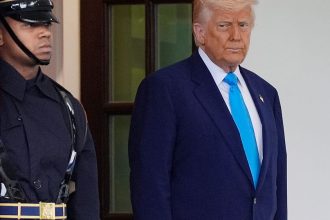In America, political conversation often feels like a battlefield, loud, personal, and exhausting. We’re constantly pushed to “pick a side,” and the more extreme that side, the more attention it seems to get. But what if there was a better way to move forward, one that doesn’t rely on conflict, but on thoughtful comparison?
That’s the bold, refreshing message behind UNUM, a book written by an anonymous author who goes simply by “ENIONE,” a play on “Anyone.” And that’s exactly the point. The ideas inside UNUM don’t come from a political insider, a pundit, or a career politician. They come from an everyday American who believes that the middle matters, and that ideas, not personalities, should guide our future.
In a recent interview, the author shared that UNUM was written to prevent what’s happening now. The rising division, talk of third parties, and a nation drifting further apart. Yet, in the book, he also lays out a practical plan to steer us back, by replacing political conflict with a contest of ideas.
Why Ideas Matter More Than Ever
One of the core messages of UNUM is that we’re focusing too much on individuals and not enough on solutions. We debate who’s right instead of what’s right. And in that environment, real progress is almost impossible.
The author urges a shift from conflict between individuals to comparison between ideas. He uses a simple but powerful riddle to explain the approach:
How do you make a line look shorter without touching it? Draw a longer line next to it.
In other words, rather than tearing down someone else’s idea, offer a better one. Put it next to theirs. Let people compare. Let ideas compete, not people.
The Two-Party System Still Has a Role
While many are frustrated with America’s two-party system, and understandably so, the author of UNUM doesn’t call for abandoning it. In fact, he writes that his preference is to work within it, bringing together moderates and centrists from both Democrats and Republicans, alongside independents and no-label voters, to form a United Government.
This isn’t about creating another “side.” It’s about building a shared space where the best ideas from all perspectives can be tested, compared, and, if they hold up, implemented.
Trump’s Mandate and What It Means
Before recent political shifts, UNUM predicted that if Donald Trump were to return to office, it would only be effective if he gained a clear and overwhelming mandate from voters. And as it turns out, that’s exactly what has happened.
The author’s take? If Trump has that mandate, he should be allowed to carry out his plan. That’s democracy. But we also must acknowledge a growing danger of more division, and a third party may make it worse, not better.
When no single group holds a clear majority, we lose the ability to act decisively. Instead, UNUM encourages us to use this moment to rethink power, not hoard it or divide it further, but share it wisely.
A Balanced Proposal of 12 Years & Three Presidents
One of the most intriguing ideas in UNUM is a 12-year United Government model, where each of the three key groups, Republicans, Democrats, and Independents, gets one presidential term to lead. This approach gives all sides time to implement ideas and be held accountable, but also ensures stability, balance, and a common national direction.
It’s not presented as a perfect solution, but as “one idea waiting for a better idea.” And that’s what makes the book so unique. It invites discussion, not dominance. It offers ideas, not ultimatums.
Let the People Choose and Fund What They Believe In
Another cornerstone of UNUM is the “pay-for-what-you-support” principle. In short, if a group of citizens wants to fund a policy or initiative, and they have enough support to sustain it, they should be allowed to do so. But if they don’t have a clear mandate, they shouldn’t force others to pay for it.
This model encourages innovation, accountability, and freedom, without requiring national consensus for every step. It’s a test-and-learn model for governance, grounded in fairness and practicality.
The Real Contest We Should Be Having
UNUM isn’t about choosing a side, it’s about creating space for multiple sides to be tested. It’s about returning to civil debate, side-by-side comparison, and outcome-driven thinking. The author’s hope is that the American people will no longer be caught in a tug-of-war between loud extremes, but instead step into a new kind of political engagement, one that elevates ideas and empowers the everyday citizen.
The book’s anonymous voice is intentional. “It’s not about me,” the author says. “I’m just a nobody. But I want the nobodies to speak up.”
And in that humility lies its power. It’s not trying to be the final answer. It’s offering the next line, so that someone else can offer a better one.
We Don’t Need More Enemies, We Need Better Ideas
At a time when American politics feels more personal, more divisive, and more chaotic than ever, UNUM brings something rare to the table, which is calm, clear, and constructive thinking.
It asks us to stop shouting and start comparing. To stop tearing down and start building better. Because real leadership doesn’t come from winning the argument, it comes from offering a better solution and letting the people decide.









